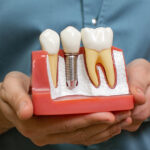Imagine a tooth replacement solution so durable and natural-feeling that it could potentially last a lifetime, directly impacting the dental implant lifespan. That’s the promise of dental implants, a revolutionary treatment that has transformed the lives of millions suffering from tooth loss. But the burning question on everyone’s mind is: how long do dental implants really last?
At Madison Dentistry & Implant Center, we understand that investing in dental implants is a significant decision. You want to know that your new smile will stand the test of time, and understanding the dental implant lifespan is key. This comprehensive guide will delve deep into the factors influencing dental implant longevity, providing you with the knowledge and actionable tips to ensure your investment yields a lifetime of confident smiles.
What Exactly Are Dental Implants? A Foundation for Longevity
Before we discuss lifespan, let’s briefly revisit what dental implants are. Unlike dentures or bridges that rest on the gums or adjacent teeth, a dental implant is a small, biocompatible titanium post surgically placed into your jawbone. This post acts as an artificial tooth root, providing a stable and secure foundation for a replacement tooth (crown), bridge, or denture.
The magic of dental implants lies in a process called osseointegration. Over time, your jawbone fuses directly with the titanium implant, creating an incredibly strong and durable connection, much like the root of a natural tooth. This solid foundation is the key to the potential long-term success of dental implants.
The Golden Question: What's the Average Lifespan of a Dental Implant?
While there’s no definitive expiration date stamped on a dental implant, the general consensus among dental professionals is that with proper care and maintenance, dental implants can last for many years, often a lifetime. Studies have shown success rates exceeding 95% after 10 years and even 80-90% after 20-25 years.
However, it’s crucial to understand that the restoration attached to the implant (the crown, bridge, or denture) may need replacement sooner due to wear and tear, typically ranging from 10 to 15 years. Think of it like a natural tooth: the root can last a lifetime, but the crown might need repair or replacement over time.
The Key Players: Factors Influencing Dental Implant Lifespan
The longevity of your dental implants isn’t set in stone. Several factors play a significant role in determining how long they will last. Understanding these factors empowers you to take proactive steps to protect your investment.
1. Meticulous Oral Hygiene: Your Daily Defense
Just like natural teeth, dental implants require diligent oral hygiene. Brushing twice a day with a soft-bristled toothbrush, flossing daily, and using an antimicrobial mouthwash are essential to prevent the buildup of plaque and bacteria.
2. Regular Professional Checkups: The Expert’s Eye
Routine visits to your dentist, like those at Madison Dentistry & Implant Center, are crucial for monitoring the health of your implants and the surrounding tissues. Your dentist will perform thorough examinations, professional cleanings, and take X-rays as needed to identify any potential issues early on.
3. Your Overall Health: A Systemic Influence
Certain medical conditions can impact the success and longevity of dental implants. For instance, uncontrolled diabetes can impair healing and increase the risk of infection. Similarly, smoking significantly hinders the osseointegration process and weakens the immune system, making implant failure more likely.
4. The Quality of the Implant and Surgical Procedure: Setting the Stage for Success
The quality of the dental implant materials and the expertise of the dental professional performing the surgery are paramount. Using high-quality, biocompatible implants and ensuring precise placement are crucial for successful osseointegration and long-term stability.
5. Bite Alignment and Bruxism: The Forces at Play
The way your teeth come together (bite alignment) and habits like teeth grinding or clenching (bruxism) can exert excessive force on your dental implants. This can lead to premature wear and tear on the implant and the restoration, potentially causing damage or failure over time.
6. Lifestyle Choices: Habits That Can Harm
Certain lifestyle choices can negatively impact the longevity of your dental implants. Chewing on hard objects like ice or hard candies, using your teeth as tools, or neglecting a balanced diet can put undue stress on your implants and compromise their stability.
Maximizing Your Implant's Lifespan: A Proactive Approach
The good news is that you have significant control over the lifespan of your dental implants. By adopting a proactive approach to care and maintenance, you can significantly increase the chances of enjoying your new smile for many years to come.
Here’s a summary of actionable steps:
- Maintain Excellent Oral Hygiene: Brush twice daily, floss daily, and use an antimicrobial mouthwash.
- Schedule Regular Dental Checkups: Visit your dentist at Madison Dentistry & Implant Center for professional cleanings and examinations as recommended.
- Follow Your Dentist’s Instructions: Adhere to any specific care instructions provided by your dental team.
- Manage Underlying Health Conditions: Work with your healthcare providers to effectively manage conditions like diabetes.
- Quit Smoking: Smoking is a major risk factor for implant failure.
- Address Bruxism and Bite Issues: Seek treatment for teeth grinding or a misaligned bite.
- Avoid Harmful Habits: Don’t chew on hard objects or use your teeth as tools.
- Maintain a Healthy Diet: A balanced diet supports overall health and healing.
- Choose an Experienced Implant Provider: Entrust your implant surgery to a reputable clinic like Madison Dentistry & Implant Center.
Investing in a Lifetime Smile: The Value of Dental Implants
While the initial investment in dental implants may seem higher than other tooth replacement options, their potential longevity and the numerous benefits they offer make them a cost-effective solution in the long run. Unlike dentures that may require frequent adjustments or replacements, well-maintained dental implants can provide a stable, comfortable, and natural-looking smile for decades, potentially a lifetime. Madison, New Jersey, is conveniently located near several other towns and cities, including Chatham, Florham Park, Harding, and Morris Townships, as well as the boroughs of Chatham and Florham Park. At Madison Dentistry & Implant Center, we believe in providing our patients with the highest quality of care and long-lasting solutions. Our commitment to excellence in implant dentistry ensures that you receive a strong foundation for a healthy and confident smile that can stand the test of time.
Conclusion: Dental Implant Lifespan
So, how long do dental implants really last? The answer is encouraging: with proper care, regular professional maintenance, and a commitment to your overall health, dental implants have the potential to last for many years, often a lifetime. By understanding the factors that influence their longevity and taking proactive steps to protect your investment, you can unlock the secrets to a truly enduring smile.
If you’re considering dental implants or have questions about their long-term care, we invite you to contact us at Madison Dentistry & Implant Center. Our experienced team is dedicated to providing you with the highest quality of care and guiding you towards a future filled with confident, healthy smiles.




